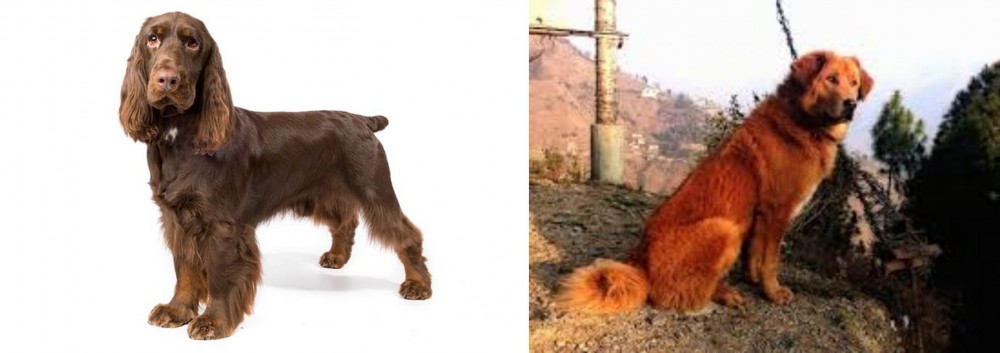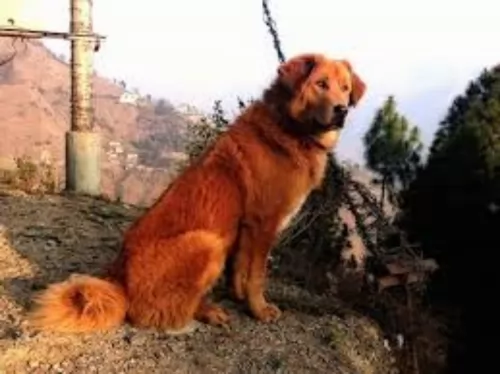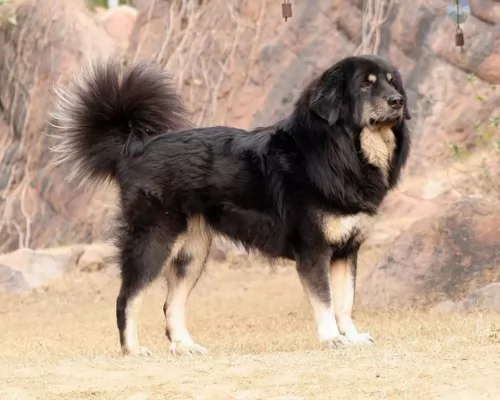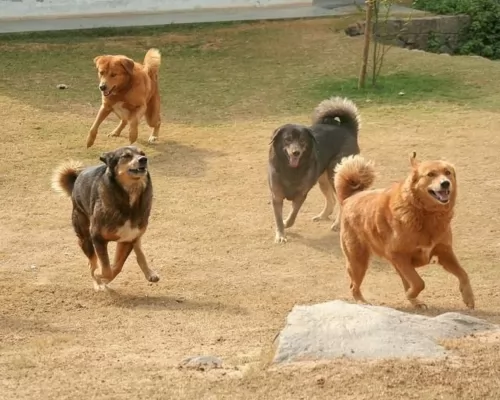 Petzlover
Petzlover Field Spaniel is originated from United Kingdom but Himalayan Sheepdog is originated from India. Field Spaniel may grow 25 cm / 9 inches shorter than Himalayan Sheepdog. Field Spaniel may weigh 20 kg / 44 pounds lesser than Himalayan Sheepdog. Both Field Spaniel and Himalayan Sheepdog has same life span. Field Spaniel may have less litter size than Himalayan Sheepdog. Field Spaniel requires Moderate Maintenance. But Himalayan Sheepdog requires High Maintenance
Field Spaniel is originated from United Kingdom but Himalayan Sheepdog is originated from India. Field Spaniel may grow 25 cm / 9 inches shorter than Himalayan Sheepdog. Field Spaniel may weigh 20 kg / 44 pounds lesser than Himalayan Sheepdog. Both Field Spaniel and Himalayan Sheepdog has same life span. Field Spaniel may have less litter size than Himalayan Sheepdog. Field Spaniel requires Moderate Maintenance. But Himalayan Sheepdog requires High Maintenance
 The Field Spaniel was developed to retrieve game, being developed in 19th century England as a hunting companion. Today they are still used as hunting dogs but he is essentially a family companion and show dog.
The Field Spaniel was developed to retrieve game, being developed in 19th century England as a hunting companion. Today they are still used as hunting dogs but he is essentially a family companion and show dog.
He was developed to be a medium-sized, all-black dog. Until 1901, spaniels were divided by weight, with the Field Spaniel being the bigger dog.With developing the breed, the Basset Hound was introduced and then English Springer Spaniels were also brought into the mix.
Today the Field Spaniel is still a rare breed even in the UK. To promote the breed, the dog has been registered as a Vulnerable Native Breed by the Kennel Club.
 The Himalayan Sheepdog comes from Nepal originally and was bred as a guardian for livestock. The exact location where the breed comes from is not documented well but it is thought that they come from North India and Nepal and they are rare outside of that area. They are a mountain dog – close in ancestry to the Himalayan Mastiff, and the Kinnaur Sheepdog of Tibet (Himalaya). All these Himalayan mountain dogs were all called “Gaddi dogs”. The term was used for all the large dogs no matter what their breeds actually were.
The Himalayan Sheepdog comes from Nepal originally and was bred as a guardian for livestock. The exact location where the breed comes from is not documented well but it is thought that they come from North India and Nepal and they are rare outside of that area. They are a mountain dog – close in ancestry to the Himalayan Mastiff, and the Kinnaur Sheepdog of Tibet (Himalaya). All these Himalayan mountain dogs were all called “Gaddi dogs”. The term was used for all the large dogs no matter what their breeds actually were.
The Himalayan Sheepdog is called by various names depending on where they were from. They are called Gaddi Leopardhund in Himachai Pradesh, In Nepal they are known as Bhote Kukkur or Bhotiya. Then there are Chamba Gaddi dogs. They are an ancient breed that existed before documentation on breeds was kept.
They acted as both guardians and herders. They guarded the mountain men’s encampments as well as the livestock. They were also used at times to hunt large animals. Today they are found only within Nepal and India. These Himalayan Sheepdogs are on the verge of extinction in India. There are no breeding programs and their isolation has caused the dilution of the gene pool. It is not recognized by any clubs including the UKC and the AKC.
 The Field Spaniel is a medium sized dog, standing at 43–46cm in height and weighing between 18–25kg. The single coat of the Field Spaniel is fairly long with the traditional feathering at the legs, belly, chest and tail.
The Field Spaniel is a medium sized dog, standing at 43–46cm in height and weighing between 18–25kg. The single coat of the Field Spaniel is fairly long with the traditional feathering at the legs, belly, chest and tail.
The coat comes in solid colours of black, liver or roan. You might also find some ticked markings of white. The tail of the Field Spaniel is traditionally docked with the ears being long and floppy.
Happy, busy and active, the Field Spaniel makes an excellent family pet. They get on well with children and with other pets in the home. It is the kind of dog, that while friendly with all members of his human family, he forms a strong bond with one member whom he regards as special.
Bright and intelligent, he is also a dog that does well when socialized and trained, being more docile and less excitable than Cocker spaniels. The Field Spaniel is a dog who thrives on being busy and won’t relish lying around with nothing to do. He loves water and where there is a dam or pond, he’ll be there and want you to join him.
 The breed is a large dog, very athletic and strong. The Himalayan Sheepdog is muscular with a deep chest, strong neck and strong shoulders. It has a medium tail that is thick and busy, curled high over its back. It is a daunting dog that can be very intimidating. They have well padded and large paws. With a broad head and wide forehead, they have a strong, wide muzzle. Their ears are high on the head and hang from the sides. They have almond shaped medium eyes that are deep set with a black nose.
The breed is a large dog, very athletic and strong. The Himalayan Sheepdog is muscular with a deep chest, strong neck and strong shoulders. It has a medium tail that is thick and busy, curled high over its back. It is a daunting dog that can be very intimidating. They have well padded and large paws. With a broad head and wide forehead, they have a strong, wide muzzle. Their ears are high on the head and hang from the sides. They have almond shaped medium eyes that are deep set with a black nose.
They are a very active and swift dogs. By their nature they are constantly in motion, patrolling their territory and guarding their flock and people. Their devotion to their people and their courage is the stuff of legends. Their coat is double with a large ruff around their necks that resembles a mane. The inner coat is dense and short while the outer coat is longer but dense as well.
 Once people have owned any of the Spaniel breeds, they discover what a wonderful friend the dog is. He is loyal, loving, protective, brave, confident, fun-loving and smart. He isn’t aggressive but he may not like a stranger to reach out and pat him.
Once people have owned any of the Spaniel breeds, they discover what a wonderful friend the dog is. He is loyal, loving, protective, brave, confident, fun-loving and smart. He isn’t aggressive but he may not like a stranger to reach out and pat him.
The Field Spaniel is a wonderful dog and he will adapt to life in the city or in the countryside, just so long as he has his beloved human family close by.
 Yes with enough proper socialization
Yes with enough proper socialization
Protection and loyalty
They are not especially adaptable and need a large yard. They are not good in an apartment.
Intelligent but stubborn and independent making them able to learn if they want to.
 The Field Spaniel is a robust dog breed and can live to be 12 – 14 years of age. Apart from watching for ear infections with his long ears, there are some common dog illnesses that are worth knowing about -
The Field Spaniel is a robust dog breed and can live to be 12 – 14 years of age. Apart from watching for ear infections with his long ears, there are some common dog illnesses that are worth knowing about -
Most older dogs have hardening of the lens and this is when the lens turns a whitish or greyish colour. However if your dog has cloudy eyes, it doesn’t simply mean he can’t see well as he often can. Once a lens has a cataract, some people try nutritional support of the lens which can work to lessen the severity of developing cataracts.
Surgery can help but a veterinary ophthalmologist can determine if cataract surgery is needed as most times it isn’t. If you can’t afford surgery, it is still important to have your dog evaluated by a veterinary ophthalmologist so that you avoid further complications with your pet’s eyes.
Progressive Retinal Atrophy is another eye disease, a degenerative disease that affects the photo-receptor cells where they deteriorate over time and can eventually lead to blindness in the affected dog.
 This is a pretty healthy breed with very few health issues. They have the usual large dog issues.
This is a pretty healthy breed with very few health issues. They have the usual large dog issues.
 The Field Spaniel has medium-length to long hair and to avoid matting of the hair, the coat will need to be brushed a least twice a week. Many Spaniel owners take their pets to professional groomers to get the coat and ears trimmed.
The Field Spaniel has medium-length to long hair and to avoid matting of the hair, the coat will need to be brushed a least twice a week. Many Spaniel owners take their pets to professional groomers to get the coat and ears trimmed.
Check your Spaniels ears inside and out regularly, because loving water the way he does, the ears inside can remain damp and become a breeding spot for infection.
Remember to also check your Field Spaniel’s teeth as dental disease can be the root cause of many diseases.
Your Field Spaniel is an active breed and you want to be sure to feed him a high-quality commercially manufactured dog food which has been formulated for his activity level. Every now and again mix in some cooked brown rice, vegetables and chicken and also add in a bit of raw meat from time to time. Ensure cool, fresh water is always available.
 Feed the puppy 2-3 times a day with a total of two cups of a quality dog food for large breed dogs.
Feed the puppy 2-3 times a day with a total of two cups of a quality dog food for large breed dogs.
Feed the adult dog twice a day with 3 to 4 cups of a high quality dry dog food for large breed dogs.
They are very strong and athletic.
The Himalayan Sheepdog needs exercise but not to be overworked. They should be taken on long walks at least once a day. They might play fetch or run in a yard, but they don’t like too much exercise.